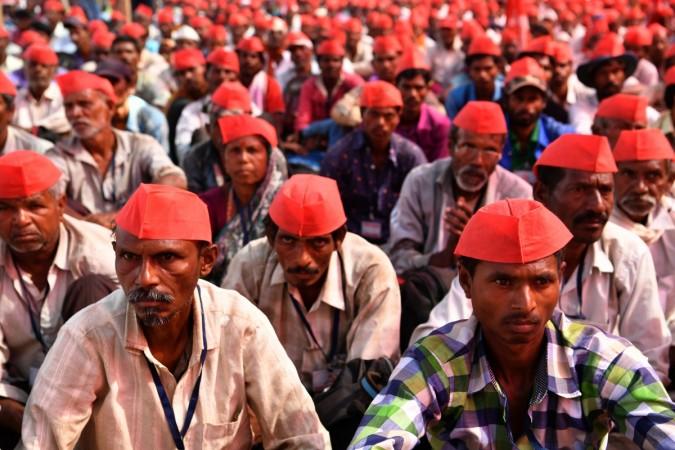
The massive success of the farmers' movement in Maharashtra was surreal. The spectacle was a throwback to the pre-ideology era. It was as if a virgin landscape had just received showers after ages and new sprouts sprang up from nowhere. Because, the utterly soulless Left politics in India had all but died and no one expected anything but ineffectual and -- it's a blow too harsh -- phoney wimpers from them.
And then comes the beautiful spectacle of tens of thousands of farmers marching to the state capital peacefully and forcing the government to accept their demands. There was an evident swing in the public mood in favor of the Long March, in which about 40,000 farmers, many of them from tribal communities, marched about 200 km to the state capital.
The march was peaceful yet fervent and it met its goals without degenerating into a haughty show of strength by armchair revolutionaries. The All India Kisan Sabha, an affiliate of the Communist Party of India Marxist (CPI-M), pulled off something the parent party has failed to do in decades.
When was the last time a proud party secretary addressed a throng of 40,000 people outside of its rank and file? Coming as it did after the party's miserable debacle in Tripura, the success of the Long March should help the Left re-imagine its role in Indian public life. It should urge them to drop their moth-eaten playbook and return to the original causes of the Left politics.
What did Long March achieve?
The significance of the farmers' march is that it knocks some sense into the Left movement in the country. It serves as a timely reminder to the duties the movement has forsaken all these years. Time hasn't been kind to Indian Marxists: their revolution never arrived and dogma had to be preserved through a painstaking circus of interpretations. The primordial itch for unattained revolution meanwhile made their tracks bloody. And morsels of power that came not through the barrel of a gun but through ambivalent compromises in ideology made them corrupt.
World's foremost anti-Stalinist communist Antonio Gramsci had foretold their fate long ago. "The crisis consists precisely in the fact that the old is dying and the new cannot be born; in this interregnum a great variety of morbid symptoms appear."
The farmers' march should make the party proud. They should reclaim their lost soul. A world of make believe around the 'dictatorship of the proletariat' and a holier-than-thou fight against right wing communalism will not make them relevant anymore. The dictatorship of the proletariat had been diluted by Lenin himself, who pushed 'democratic centralism' as a viable alternative in the political vicissitudes that existed in his time.
Trotsky had forebodings about democratic centralism and said this could soon lead to ultimate power concentrating in the politburo and eventually in the party general secretary. His fears came true soon, with the rise of Joseph Stalin after Lenin's death. Trotsky himself was assassinated even as Stalin carried out a bloody purge within the party. Sadly the ghosts of Stalin is worshipped in the Indian remnant of Marxism.
Stalinism without the fig leaves
This party doesn't even offer its members the right to resign. This is what the party constitution says about the option to resign. "If the resignation is on political grounds, the unit may refuse to accept the resignation and may expel him. In the case where a party member wishing to resign from the party is liable to be charged with serious violation of party discipline which may warrant his or her expulsion and where such a charge is substantial, the resignation may be given effect to as expulsion from the party."
This is not even consistent with the flawed democratic centralism. This is Stalinism without the fig leaves. It explains why ex-members are hunted down and killed with impunity. The case of the killing of TP Chandrasekharan in Kerala had shocked national conscience. But the party was unfazed. A purely fascist act of exterminating an ideological opponent was celebrated by the cadres and the moronic leaders. And they keep repeating these atrocities. The latest is the most ghoulish killing of young Congress party worker Shuhaib whose mistake was to air the voice of political alternative in a party village.
It doesn't dawn on the small-minded party leadership that insane blood-letting is so anachronistic. It's a marvel that they do get to keep a slavish vote bank even in a modernized state like Kerala, their only outpost still standing. The blood thirst is not the only anachronism though. The warped ideology they worship make their leaders utter inanities at periodic intervals. Their ideology is stuck with the outdated imperialism-centric narrative. The top boss of the party in Kerala recently praised North Korea as the epitome of socialism. He then said India is in league with western forces trying to destabilize China, another jewel in the Marxian socialist crown.
Sadly today's Indian Marxists offer only a comical ensemble of an anti-fascist resistance sponsored by the dyed-in-the-wool fascists. Things can change, however. And change should happen for the good of the country. India of the present needs a Left. The success of the Long March from Nashik to Mumbai underscores that. Will the declining and decaying Left understand?

















